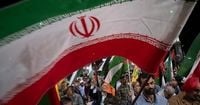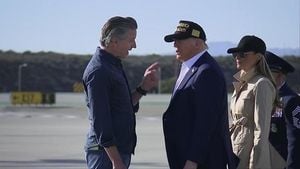Amid escalating tensions in the Middle East, the United States is preparing for a potential military confrontation between Israel and Iran, with significant implications for regional stability and global security. According to multiple sources cited by CBS News, Israel is "fully ready" to launch a military operation against Iran, a move that could dramatically alter the fragile diplomatic landscape and provoke retaliatory strikes against American assets across the region.
The backdrop to this alarming development is the growing concern over Iran's advancing nuclear program. US intelligence officials estimate that Iran is inching closer to acquiring nuclear weapons capability, with the International Atomic Energy Agency (IAEA) recently reporting that Iran’s uranium stockpile has surged to 408.6 kilograms enriched up to 60% purity—alarmingly close to the 90% enrichment threshold needed for a nuclear bomb. This represents a nearly 50% increase from earlier in 2025, signaling rapid progress in Tehran’s nuclear ambitions.
Despite ongoing diplomatic efforts, including the planned sixth round of indirect nuclear talks between US envoy Steve Witkoff and Iranian Foreign Minister Abbas Araghchi scheduled for mid-June in Oman, progress remains uncertain. US President Donald Trump has expressed waning confidence in the negotiations, stating on the "Pod Force One" podcast, "I'm getting more and more less confident. Something happened to them." Trump has been clear that the US will not accept a nuclear-armed Iran, emphasizing at the Kennedy Center on June 11, 2025, "We're not going to allow that." However, Iranian officials maintain that their nuclear program is peaceful, intended for energy and medical purposes, a claim met with skepticism by both the IAEA and US intelligence.
Israel’s stance is equally firm. Under Prime Minister Benjamin Netanyahu, the Israeli government believes Iran is exploiting talks as a cover to advance its nuclear capabilities. Netanyahu’s office asserts that Israel has conducted "countless overt and covert operations" to delay Iran’s progress but now sees military action as potentially necessary. Netanyahu has long opposed any agreement permitting Iran to continue uranium enrichment, clashing publicly with former US President Barack Obama over the 2015 nuclear deal. In May 2025, Trump reportedly advised Netanyahu to delay any military strikes to allow negotiations to proceed, a restraint that appears to be fraying.
Washington is bracing for the fallout of any Israeli strike. US officials anticipate that Iran could retaliate against American facilities, particularly in neighboring Iraq. In response, the US State Department ordered the evacuation of non-emergency government personnel from Iraq on June 11, 2025, citing "heightened regional tensions," while the Pentagon authorized voluntary departures for military dependents across the Middle East. President Trump confirmed the evacuations, noting the region "could be a dangerous place," and underscored the administration’s commitment to protecting American citizens.
Iran’s Defense Minister, General Aziz Nasirzadeh, issued a stark warning to the US on June 11, 2025, declaring, "If conflict is imposed on us, the opponent’s casualties will certainly be more than ours, and in that case, America must leave the region, because all its bases are within our reach. We have access to them, and we will target all of them in the host countries without hesitation." This threat underscores the precariousness of US military installations in Iraq, Kuwait, Qatar, Bahrain, and the UAE, all within missile range of Iran and its proxies.
Further complicating matters, groups aligned with Iran, such as Hezbollah and Yemen’s Houthis, have pledged to oppose US and Israeli influence, contributing to a volatile regional atmosphere. The past year has seen unprecedented direct exchanges of fire between Iran and Israel, with missiles and drones crossing Iraqi airspace—an alarming escalation previously unthinkable.
US military leadership is actively preparing for various contingencies. Defense Secretary Pete Hegseth testified on June 11, 2025, to Congress that "there are plenty of indications that Iran has been moving their way towards something that would look a lot like a nuclear weapon." Meanwhile, General Erik Kurilla, head of US Central Command, has presented President Trump with "a wide range of options" to prevent Iran from reaching nuclear breakout. Notably, Kurilla postponed a Senate testimony originally scheduled for June 12, 2025, fueling speculation about heightened military alertness.
While the US is reportedly weighing ways to support Israeli military action—potentially through aerial refueling or intelligence sharing—it is unlikely to participate directly with B-2 bombers capable of penetrating Iran’s fortified underground nuclear facilities at Fordow and Natanz. Without such support, Israeli strikes may be limited in their ability to fully dismantle Iran’s nuclear program.
The international community is also on edge. On June 11, 2025, Britain’s Maritime Trade Organization issued a rare advisory urging caution for ships navigating key waterways including the Persian Gulf, Strait of Hormuz, and Gulf of Oman, citing increased risks of military escalation. These corridors are vital for global oil trade, with the Strait of Hormuz alone accounting for roughly 20% of the world’s petroleum transit.
Market reactions have been swift. News of embassy evacuations and potential conflict sent Brent crude oil prices soaring over 4% to more than $69 per barrel, with further spikes expected if hostilities disrupt shipping lanes near the Strait of Hormuz.
Against this tense backdrop, the US continues to pursue diplomatic avenues, with Witkoff’s upcoming talks in Oman representing a last-ditch effort to reach an agreement. Yet, the stark warnings from both Tehran and Jerusalem, coupled with the military posturing on all sides, suggest that the region stands on the brink of a wider conflict.
As the world watches, the question remains: will diplomacy prevail, or will the Middle East be plunged into a new and devastating chapter of warfare?




